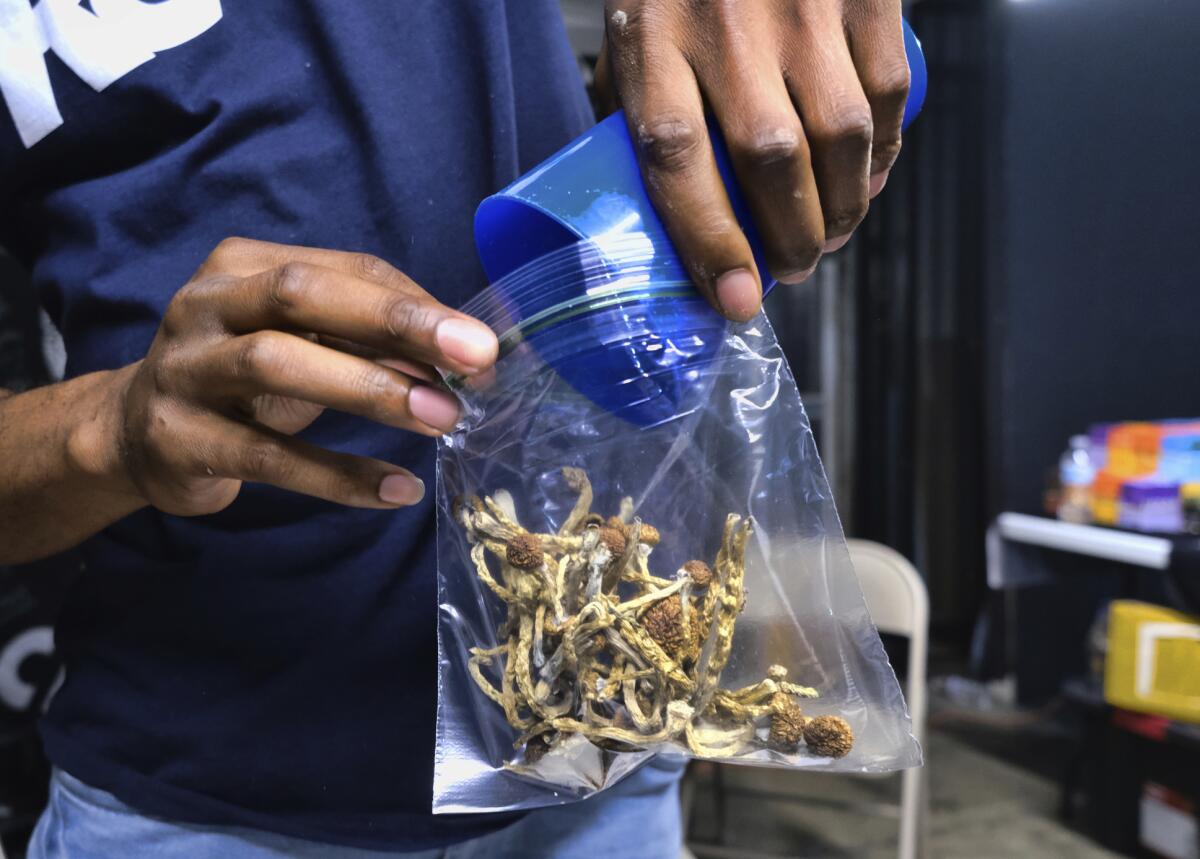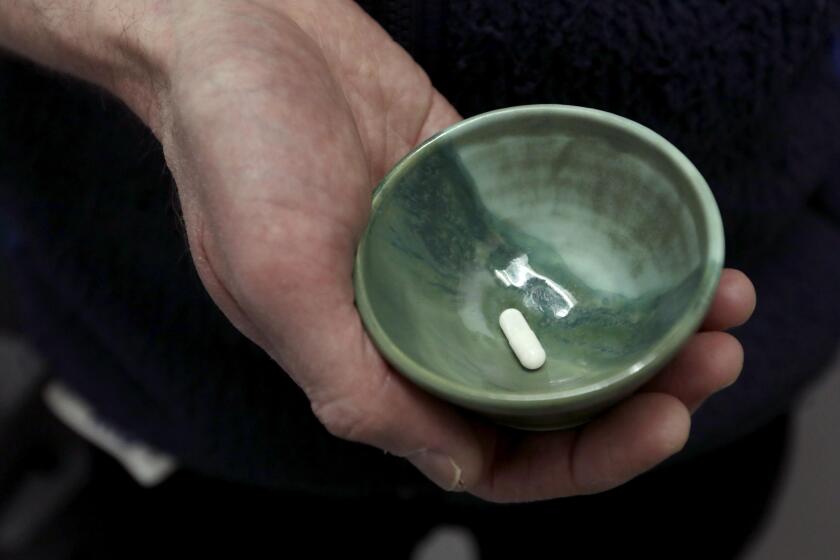California moves to decriminalize use of magic mushrooms and other natural psychedelics

- Share via
California lawmakers on Thursday narrowly approved a bill supported by veterans and criminal justice reform advocates to decriminalize the possession and personal use of a limited list of natural psychedelics, including “magic mushrooms.”
Gov. Gavin Newsom will now decide the fate of Senate Bill 58, which would remove criminal penalties for the possession and use of psilocybin and psilocin, the active ingredients in psychedelic mushrooms, mescaline and dimethyltryptamine, or DMT, known as ayahuasca. The bill also would require the California Health and Human Services Agency to study the therapeutic use of psychedelics and submit a report with its findings and recommendations to the Legislature.
The measure passed the Senate 21 to 14, with several Democrats opposing.
“California’s veterans, first responders, and others struggling with PTSD, depression, and addiction deserve access to these promising plant medicines,” state Sen. Scott Wiener (D-San Francisco) said in a statement after the bill passed the Assembly in a bipartisan 42-11 vote. “It’s time to stop criminalizing people who use psychedelics for healing or personal well-being.”
The measure would apply only to those 21 and older and does not authorize the personal transfer or sale of psychedelics in dispensaries. Rather, it would mean police cannot arrest people who have or use limited amounts of the drugs. Oakland and Santa Cruz have passed similar measures.
Criminal justice reform advocates said decriminalizing psychedelics is a step toward ending a war on drugs, while veterans groups said it would help destigmatize psychedelics that, in some cases, have been more effective in treating post-traumatic stress disorder, anxiety and depression than traditional drugs and therapies.
Jesse Gould, a former army ranger and founder of the Heroic Hearts Project, SB 58’s sponsor, said the measure would help prevent veterans from having to make the choice between “saving their own life or becoming a criminal in the eyes of their country.”
Gould said psychedelics helped him through his own journey with PTSD after three deployments to Afghanistan. He said many of his organization’s clients have similarly turned to hallucinogens for relief after other interventions didn’t work.
“This is just very basic, people should not be criminalized if they are using personal possession of these substances. If people are choosing to do that in their own privacy, they should absolutely be able to have that ability,” Gould said. “We just came out of 20 years of war. There’s clearly a mental health issue.”
The measure that passed the Senate is a narrowed version that Wiener first introduced last year that would have also decriminalized the use and possession of MDMA, commonly known as ecstasy, and LSD. Wiener also agreed this summer to cut ibogaine, a psychoactive alkaloid found in the iboga shrub, from the decriminalization portion of SB 58 and instead added it to the list of therapeutics to be studied.
The California Legislature on Thursday amended Senate Bill 519 to make it only a study of decriminalizing certain psychedelic drugs. State Sen. Scott Wiener (D-San Francisco), who wrote the measure, said he will reintroduce it next year.
Those changes eased some concerns among lawmakers, including a handful of Republicans who voted for the proposal.
Assemblymember Bill Essayli (R-Corona) said he was convinced to support the bill after it was revised to include only three plant-based psychedelics and because it is largely limited to personal use and has an age requirement of 21.
“I think the data is clear that while pharmaceuticals certainly have a benefit to some people, it’s not having a benefit on all of society,” Essayli said. “And I think we can say our approach to mental health in the medical community is not working. I think we are worse off now than we were before.”
But the bill divided Democrats, with many of the caucus’ more moderate members either abstaining or voting in opposition of the measure. Law enforcement lobbied against the proposal, arguing that the drugs were understudied and could lead to a surge in crime. Parental organizations also worry that the bill lacks the necessary guardrails to keep young adults and teenagers from experimenting with the drugs.
Lisa Hudson, a Marin County mom who has opposed the bill, said her 16-year-old son Shayne Rebbetoy died at their home after taking mushrooms and running off their deck, thinking he could fly. Hudson said the bill fails to include the necessary education, research and training for first responders.
Van Nuys-based astrologer and witch Gogo Akopyan promises to tell you about your past, present and future. But first: coffee, stirred clockwise, with intention.
“I fear more deaths amongst teenagers, amongst young adults, amongst veterans, and people who are searching for this therapeutic benefit,” Hudson said. “Because in an unregulated model, you’re spinning the roulette wheel. ... To me, it’s just so irresponsible and reckless.”
Newsom has until Oct. 14 to approve or veto hundreds of bills. If signed, the bill would go into effect on Jan. 1, 2025.
More to Read
Sign up for Essential California
The most important California stories and recommendations in your inbox every morning.
You may occasionally receive promotional content from the Los Angeles Times.
















